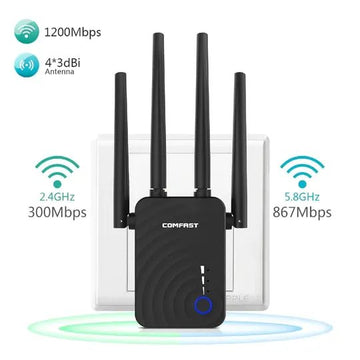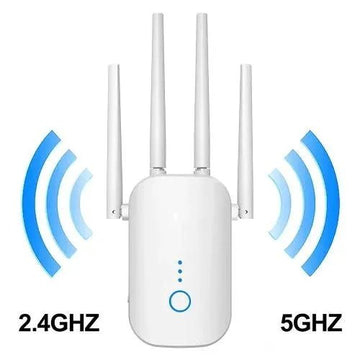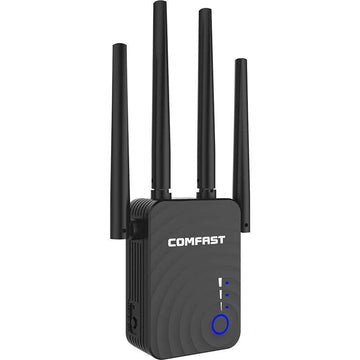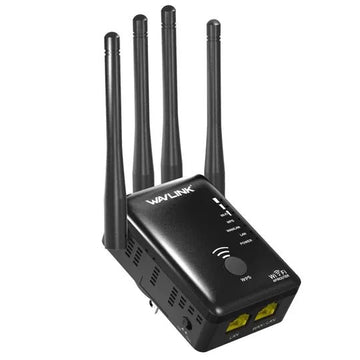Boost Your WiFi Signal: Exploring the Differences Between WiFi Boosters, Repeaters, and Extenders
Having a strong and reliable WiFi signal is crucial in today's connected world. Whether you're working from home, streaming your favourite shows, or playing online games, a weak WiFi signal can be frustrating and hinder your productivity. Fortunately, there are solutions available to boost your WiFi signal and extend its reach. In this article, we will explore the differences between WiFi boosters, repeaters, and extenders, helping you make an informed decision to enhance your WiFi experience.
WiFi Boosters
WiFi boosters, also referred to as WiFi amplifiers or range extenders, play a vital role in enhancing the existing WiFi signal strength. These devices work by receiving the WiFi signal transmitted by the router and then amplifying it to overcome obstacles or signal interference that may hinder its reach. By boosting the signal, WiFi boosters effectively increase the coverage area of your WiFi network. Once the signal is amplified, the booster rebroadcasts it, allowing devices located in areas with weaker signals to establish a stronger connection. One of the advantages of WiFi boosters is their user-friendly setup process. They are typically easy to install and require minimal configuration, making them accessible even for users with limited technical expertise. WiFi boosters are an excellent choice for improving WiFi signal strength in specific areas of your home or office where the signal may be weaker, such as basements, upper floors, or corners of large rooms. By utilising WiFi boosters, you can significantly enhance your WiFi experience and ensure a more reliable and stable connection in areas that previously suffered from poor signal strength.
WiFi Repeaters
WiFi repeaters, also known as range expanders, operate in a similar manner to WiFi boosters, but with a slight difference in their functionality. Rather than amplifying the existing WiFi signal, WiFi repeaters receive the signal from the router and regenerate it before rebroadcasting it to extend the coverage area. In essence, they create a new network within the existing one, acting as intermediaries between your devices and the router. By doing so, WiFi repeaters effectively increase the range of your WiFi network, allowing you to connect to the internet from areas that were previously out of reach. However, it's important to note that WiFi repeaters can introduce a slight degradation in the overall network performance. This is because they need to receive and transmit the signal, which adds an extra step in the communication process and may result in a slightly slower connection speed compared to a direct connection to the router. Nonetheless, WiFi repeaters remain a viable option for extending the range of your WiFi network, especially in scenarios where a direct wired connection or a WiFi extender is not feasible.
WiFi Extenders
WiFi extenders, often known as wireless access points, differ from boosters and repeaters in the way they operate. Rather than rebroadcasting the existing WiFi signal, WiFi extenders create a new network by establishing a direct connection with the router through a wired Ethernet connection. They then broadcast a new WiFi signal, effectively extending the coverage area. WiFi extenders offer better performance and faster speeds compared to boosters and repeaters, making them ideal for larger homes or offices with multiple devices.
Key Differences Between WiFi Boosters, Repeaters, and Extenders
Understanding the key differences between WiFi boosters, repeaters, and extenders is crucial in choosing the right solution to improve your WiFi signal. One significant difference lies in their range extension capabilities. WiFi boosters amplify the existing signal, while repeaters regenerate it and extenders create a new network. As a result, extenders generally offer the largest coverage area, making them ideal for larger homes or offices. Another distinction is the signal strength and coverage provided. Boosters and extenders typically offer stronger signals and broader coverage compared to repeaters. Additionally, the setup and compatibility differ among these devices. Boosters and repeaters are usually plug-and-play devices, requiring minimal configuration. In contrast, extenders often necessitate a wired connection to the router for optimal performance. Lastly, the performance and speed considerations set WiFi extenders apart. Due to their direct wired connection, extenders generally offer better performance and faster speeds compared to boosters and repeaters. By understanding these key differences, you can make an informed decision that aligns with your specific needs and enhances your WiFi experience effectively.
Factors to Consider When Choosing Between WiFi Boosters, Repeaters, and Extenders
When choosing between WiFi boosters, repeaters, and extenders, several factors should be taken into consideration to ensure the best solution for your specific needs. Firstly, assess your existing WiFi setup and network requirements. Determine the type of router you have, its compatibility with different devices, and the network protocols it supports. Secondly, consider the coverage area and range requirements. If you have a large home or office space, a WiFi extender with its ability to create a new network and provide broader coverage might be the most suitable choice. However, if you only need to boost the signal in specific areas, a WiFi booster or repeater could suffice. Budget and cost considerations are also important. WiFi boosters and repeaters generally tend to be more affordable compared to extenders, which offer advanced features and better performance. Finally, consider the ease of installation and setup. WiFi boosters and repeaters often require minimal configuration and can be set up easily. On the other hand, WiFi extenders may require a wired connection to the router, which could be more complex depending on the layout of your space. By carefully evaluating these factors, you can make an informed decision and choose the option that best aligns with your requirements and enhances your WiFi signal effectively.
Conclusion
Improving your WiFi signal strength and extending its range is crucial for a seamless online experience. WiFi boosters, repeaters, and extenders offer different approaches to achieve this goal. By understanding their differences and considering factors like range, signal strength, setup, and performance, you can make an informed decision and select the option that best meets your needs. Enhancing your WiFi signal will ensure faster speeds, better connectivity, and a more enjoyable online experience for all your devices.





